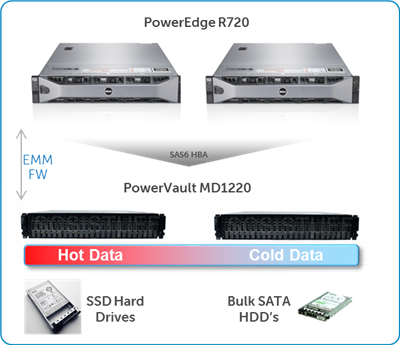When talking to mutual Dell and Microsoft customers across all market segments, we get a variety of different requirements reflecting their business pain points. Frequently those conversations revolve around challenges with storage. A common request we hear from hosters and cloud-providers is for cost-efficient platforms with highly available and highly scalable data access. And unlike many traditional data centers, these organizations have developed their own storage management and data services applications or their own file systems. They tell us they often don’t need the “bundled” set of data services and features that come with storage area network (SAN) systems.
Microsoft’s Storage Spaces, a technology in Windows Server 2012 R2, combined with Dell’s PowerEdge servers and PowerVault storage expansion solutions, can help organizations like hosters and cloud-providers that don’t have the feature-set needs for a separate storage array to deliver advanced, enterprise-class storage capabilities, such as continuous availability and scalability, on affordable industry-standard servers and storage.
Microsoft Storage Spaces software-enabled storage to help reduce cost, increase flexibility
The second generation version of Microsoft Storage Spaces in Server 2012 R2 allows sophisticated virtualization of the storage stack, creating storage pools with advanced features such as storage aggregation, elastic capacity expansion, and delegated administration.
 The storage pool can be composed of a mixture of solid state drives (SSDs) (fast tier) and inexpensive, bulk hard disk drives (HDDs) (standard tier). Frequently accessed (hot) data in a tiered storage space gets moved to the SSD in the fast tier, while infrequently accessed (cold) data is moved to the high-capacity hard disks in the standard tier. This enables customers to balance capacity and performance.
The storage pool can be composed of a mixture of solid state drives (SSDs) (fast tier) and inexpensive, bulk hard disk drives (HDDs) (standard tier). Frequently accessed (hot) data in a tiered storage space gets moved to the SSD in the fast tier, while infrequently accessed (cold) data is moved to the high-capacity hard disks in the standard tier. This enables customers to balance capacity and performance.
In addition, powerful caching features in Storage Spaces can be enabled with Dell SSD products to support I/O intensive workloads like virtual desktop infrastructure (VDI). Storage Spaces uses the SSDs (which excel at random access) in the storage pool to create a durable write-back cache that buffers small random writes to SSDs before later writing them to HDDs. This reduces the latency of the random writes and significantly reduces any impact on data transfer performance.
And Storage Spaces is compatible with other Server 2012 R2 storage features, including Server Message Block (SMB) 3.0, Hyper-V, Failover Clustering, Cluster Shared Volumes (CSV), Storage Quality-of-Service (QoS), and Hyper-V Replica. All storage features are accessible through a single, integrated management interface, making it simple to deploy.
Dell PowerEdge and PowerVault help optimize the benefits of Storage Spaces
With Storage Spaces running on the highest performing, most innovative Dell PowerEdge servers and Dell PowerVault storage expansion solutions ever, customers like hosters and cloud providers can enable cost-effective, highly available and highly scalable workloads. Fully engineered for virtualization with large memory support and enhanced I/O throughput, PowerEdge servers enable organizations to maximize the comprehensive virtualization platform offered in Server 2012 R2. The PowerVault MD expansion series, with its wide range of array form-factors, connectivity options and expansion chassis, offers unparalleled flexibility to extend performance or capacity as needs change. And with best-in-class integration between Dell network management technologies, systems management solutions, and Microsoft System Center 2012 R2, our mutual customers can be more efficient and agile.
Learn more about selecting Storage Spaces compatible Dell hardware and firmware, and find information on supported storage configurations in this white paper: Deploying Windows Server 2012 R2 Storage Spaces on Dell PowerVault MD1200 and 1220. And contact your Dell representative to discuss how PowerEdge and PowerVault can help you optimize the benefits of Server 2012 R2 with Storages Spaces.
